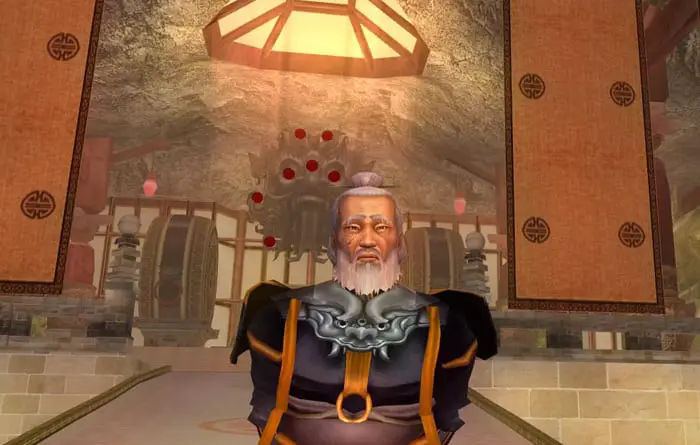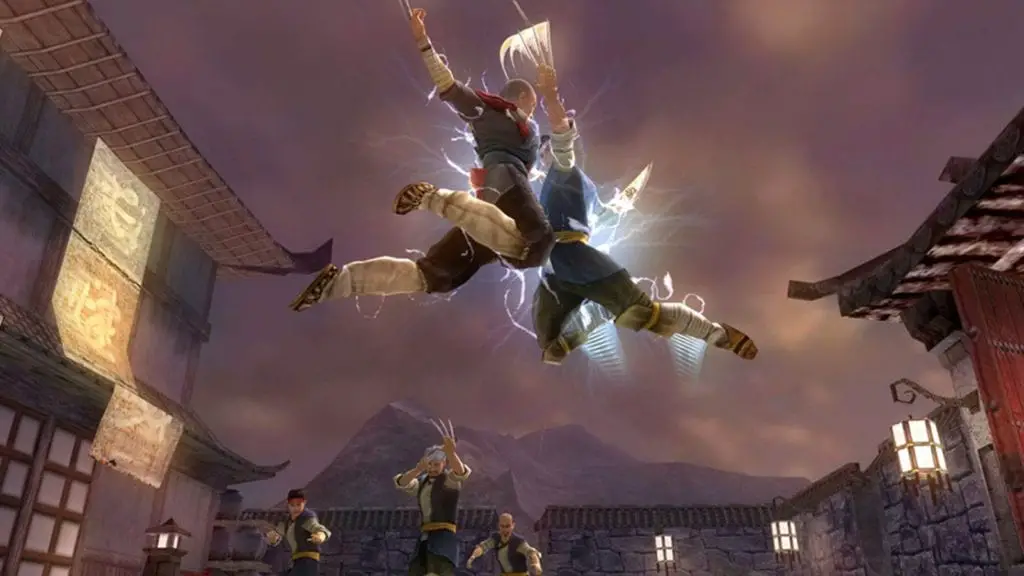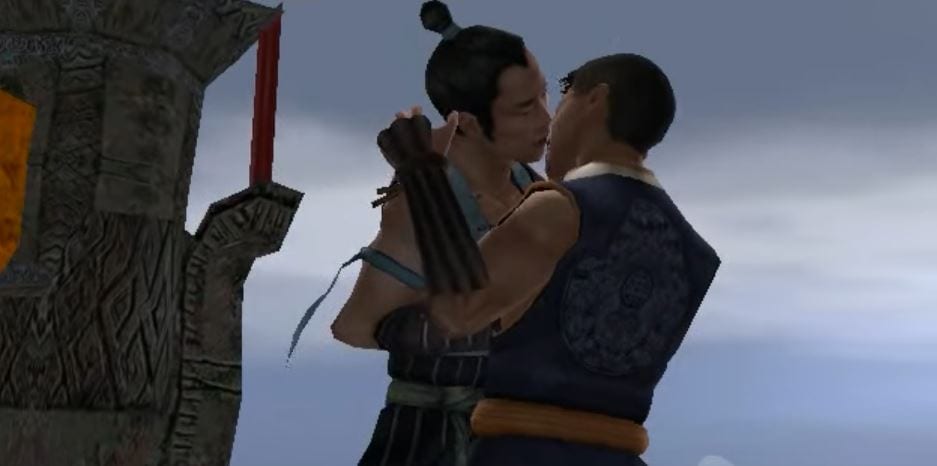Happy New Year, readers of The Fandomentals. Let’s hope it’s a little better than the last one, eh? I hope I can contribute to that with my first article in 2017. This time, I’m going to discuss Jade Empire. It’s an old game from BioWare that does not get much appreciation. And while it’s not a masterpiece by any means, I think it deserves some attention, if nothing else. Unfortunately, I can’t talk about some parts of it without major spoilers. So I warn you now if you don’t want to see them.
Jade Empire is an action-RPG set in a wuxia setting. The titular Jade Empire is most reminiscent of China. As you’d expect from the genre, the game places a lot of emphasis on martial arts of all sorts and shapes. Old masters, forbidden techniques, legendary styles, fabulous weapons…it’s all here.
In many ways, Jade Empire is an extremely typical BioWare RPG from an earlier era. The protagonist is a student of the old, wise Master Li, studying martial arts in a secluded village. They’re his favorite student, much to the chagrin of Gao the Lesser, one of the other students.
It’s not long before the village is attacked, and the protagonist’s identity is revealed. They’re the last of the Spirit Monks, a secretive group that once oversaw the temple of Dirge, where dead souls passed into the great wheel of reincarnation. The Emperor Sun Hai coveted the monks’ power and destroyed Dirge. Meanwhile, his brother, Sun Li the Glorious Strategist, carried the protagonist away—Sun Li being none other than our Master Li.
Sound familiar? It certainly does, unless you haven’t played any other games of the genre. But there’s more to it than meets the eye. To start with, Master Li is the mastermind behind the whole game, and betrays you. He groomed the protagonist specifically to use their status as a Spirit Monk to seize power for himself, and then strike them down. Only an intervention from a goddess foiled his long, careful plan. His conflict with his brother was a power struggle, not an attempt to stop him from seizing power.
I don’t really know how many people saw it coming—I didn’t. But the reason I think it’s interesting is because it operates on a meta level. Master Li, aka Sun Li the Glorious Strategist, is an exposition-delivering NPC in a BioWare game, and an old master in a wuxia story. Those are two character archetypes that we just don’t expect to betray us.
As with many such twists, it’s interesting to look back on what might have hinted towards them. In the case of Jade Empire, it’s primarily other people’s perceptions of Sun Li. You have the opportunity to speak with people who knew him as the Glorious Strategist in the past, before he went to ground. The first is Sagacious Zu, your companion with a murky past. The other is a common soldier Sul Li left behind to impart information and a martial style on you.
Those two do not remember Sun Li as the kindly, wise martial arts master. They remember him like he was: a ruthless, brilliant man who treats people like tools. This indicates that the Master Li we know is a mask, since it depends on the player whether they will pick up on it or not. I didn’t. Another meta element of the twist is the cutscene we see of Dirge’s fall. When Master Li tells us his version, we see an old man carry away a baby—our character. When we find the truth, we see the “uncut” version of the scene, in which Master Li is actually the armor-clad figure accompanying the emperor, and cuts down the old monk who had saved us.

That twist aside, the writing in the game is nothing to, pardon the pun, write home about. There are some interesting themes, but the game largely looks past them. The themes I’m talking about are those of hierarchy and order versus chaos.
The world of Jade Empire is very hierarchical. The titular Empire has a social order where everyone, from a peasant to the Emperor, has their place. The gods and spirits have their own intricate Celestial Bureaucracy. By and large, the “good” options involve preserving both of them while weeding out people who abuse it.
Yes, the “good” option. There’s a very clear delineation between good and evil in the game. It’s not presented this way, but that’s how it goes down. The protagonist’s morality manifests itself in two bars, as it often does. In Jade Empire, we’ve got two philosophies: Open Palm and Closed Fist. That is to say… good and evil. Early on, we meet a monk who explains why they’re not good and evil, but that’s where any nuance ends. An Open Palm character helps and heals, while a Closed Fist one is a cruel, petty bully.
If there are any who read it and played Mass Effect, this might feel familiar. The Open Palm/Closed Fist duality resembles the Paragon/Renegade options in that series, but where that division is frequently poorly-implemented, the one in Jade Empire falls entirely flat.
It’s a shame, truly, more so because there we can spot some inklings of the more interesting approach, here and there. The monk who explains the philosophies to us says that the risk of the Open Palm philosophy is making people depend on you, and depriving them of liberty. This materializes not at all in the actual game… except for Sun Li.
His ultimate goal is to usurp the power of Heaven and make himself a living god-emperor. At which point, he’ll remake the Jade Empire as a place of order, where everyone has their place that he ascribes to them. Which, at least to me, sounds like the extreme the monk spoke of; the risk that in trying to introduce order, we’ll decide that we know better and everyone should just do as we say. After all, we’re stronger and wiser than they are, so why shouldn’t they leave this decision to us? It’s faint, but it’s there.
Unfortunately, the Closed Fist philosophy doesn’t get even that. The initial outline describes it as espousing independence and self-reliance. It could be an interesting exploration of resistance against the rigid norms of the setting, but it isn’t. Instead, it’s a rather typical evil path in an RPG—you solve problems by force, threaten people and take what you want.
The closest we get to Closed Fist characters who are a bit more nuanced are Silk Fox and Sagacious Zu, who take up the required role of companions that suggest pragmatic solutions, point out that you can’t help everyone you meet (even though you can) and aren’t afraid to get their hands dirty.
That’s for the writing. What does the game’s mechanical aspects look like? Jade Empire is an action RPG pretty thoroughly. You only control your protagonist, and fight like in many other games of this kind: fast attacks, strong attacks, dodging, blocking. Dodging lets you avoid strong attacks, but can’t fool fast ones; blocking protects you from fast strikes but strong ones punch through.

Nothing too wild here. It’s still far more dynamic than combat in Dragon Age: Inquisition, not that it’s difficult. The player gets two resources to spend, apart from health. You use chi to heal, enhance your attacks and power magic styles. Focus powers weapon styles and can slow down time around you. Where it gets really interesting are the fighting styles.
The techniques available to the player are divided into martial styles, weapon styles, magic styles and transformation styles. The first are the most “vanilla” option. They require no resource and use hand-to-hand attacks. Weapon styles are more powerful, but require you to spend focus with each strike. Also, they can’t harm immaterial beings like ghosts.
Magic styles are more versatile, as they allow you to strike at a distance and immobilize enemies, but they require chi expenditure. Support styles don’t do direct damage, but inflict conditions on enemies and can trigger combos with other styles. Finally, transformation styles grant you significant power, but drain chi all the time, so they don’t last long.
The player can have four styles “equipped” at the same time, and switch between them freely. Trying them all out and finding the combination that best suits you, before mixing it up for variety’s sake, is really half the fun of the whole game. One thing does get in the way of that, though, namely that there’s no re-specialization option. The points you invest into various fighting styles stay there forever, so you can’t try them out as freely as I’d like.
Another snag is that the various styles aren’t very well-balanced. Of the three martial styles you can start with, one is unimpressive and one is clearly superior. Later on, the dual-sabre weapon style lets you rip through enemies with frightening ease. And so on.
A rather amusing situation occurs in a climactic boss fight about ¾ into the game. The boss switches between different styles, while becoming immune to some of yours… but he never becomes immune to transformation styles. So you can just transform into a jade golem and beat down on him until he ceases to be a problem.
The tactics in the game revolve around switching between different styles, managing your resources, and using appropriate defenses. Unfortunately, like I said, there are certain styles and combinations that are just better. Moreover, using appropriate defenses is sometimes difficult. Particularly in the case of spirits, which you encounter fairly frequently – they use either a powerful bolt of essence that must be dodged, or a homing bolt of energy that must be blocked. But it’s very hard to tell which they’ll use until it’s too late.
Your companions are of no particular help in the fights, unfortunately. While I appreciate not having to babysit them, the best solution tends to be taking Dawn Star and having her passively regenerate your chi—most companions can either take active part in combat or provide a passive benefit. Chi is the lifeblood of your character, as it can serve as both offense and defense.
Despite all that, the martial arts are why this game has a place in my heart, despite most everything in it being rather average. Balance notwithstanding, trying out different combinations of styles is very entertaining. Their variety is something few other action-RPGs really match. Dark Souls (as well as Demon Souls and Bloodborne, but I can’t play those on PC) is the only game that really comes close, with its varied move-sets for different weapons. I would like to see a game that refines those concepts and does something about all the elements that don’t work.
As an aside, a minor point of interest are romances. Jade Empire has three potential love interests for the Spirit Monk: two women and a man. The first one, Dawn Star, is a rather typical BioWare love interest in many ways. She’s a childhood friend, and accompanies us from the beginning. She will only romance men. The other two are Silk Fox (the cover identity of Heavenly Lily, the princess of the Empire) and the adventurer Sky. Both of them can go for men or women.
It would, I believe, make them one of the earliest non-heterosexual romance options in BioWare’s games. Which comes with its baggage, since their same-sex romances are harder to get—you need to completely abstain from pursuing heterosexual options, or be locked out of them. That, and when the Spirit Monk finally kisses their love interest near the endgame… the scene fades to black as they embrace if their lover is of the same gender. Still, it was an early step on a road that eventually brought us to Dragon Age: Inquisition.

That being said, while Dawn Star will only enter a relationship with a male Spirit Monk, if you romance both her and Silk Fox, you can end up in a polyamorous relationship with them. Which I think is fairly unique.
Jade Empire is a diamond in the rough, really. It lacks some rather definite polish, but it has some ideas that I rarely, if ever, see anywhere else. While I can’t fully endorse it, knowing its flaws, I think it definitely merits attention, and it’s worth a try, given the opportunity.

